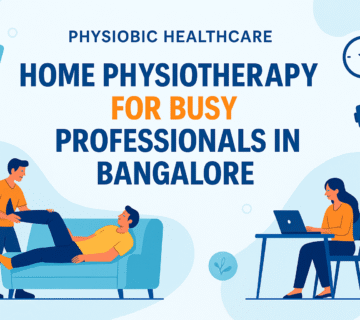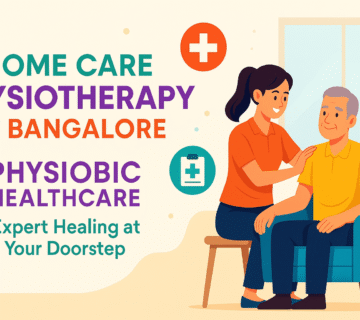Introduction to Guillain-Barré Syndrome Physiotherapy at Home Bangalore
Guillain-Barré Syndrome (GBS) is a rare neurological disorder characterized by rapid-onset muscle weakness caused by the immune system attacking the peripheral nervous system. Although GBS can be life-threatening, most patients recover with appropriate treatment. One effective approach to recovery is physiotherapy, which can significantly enhance the rehabilitation process. This article focuses on the benefits and methodologies of Guillain-Barré Syndrome Physiotherapy at Home Bangalore for individuals with Guillain-Barré Syndrome.
Understanding Guillain-Barré Syndrome Physiotherapy at Home Bangalore
GBS often begins with weakness and tingling in the legs, which can progress to muscle paralysis. The exact cause remains unclear, but it frequently follows infections such as the flu or gastroenteritis. Early diagnosis and treatment are crucial for improving recovery outcomes.
Symptoms of Guillain-Barré Syndrome
- Muscle weakness starting in the legs and spreading to the upper body.
- Tingling or prickling sensations.
- Difficulty with eye movement, facial movement, or swallowing.
- Severe pain, especially at night.
- Rapid heart rate and fluctuations in blood pressure.
Importance of Early Intervention
Early intervention is critical in managing GBS. Physiotherapy plays a vital role in preventing complications such as muscle atrophy, contractures, and respiratory issues. Hence, home physiotherapy offers a convenient and effective solution for ongoing rehabilitation.
Physiotherapy at Home Bangalore for Guillain-Barré Syndrome
Physiotherapy at home provides patients with a comfortable environment to receive care while focusing on individualized rehabilitation plans. This approach fosters a supportive atmosphere, encouraging recovery and enhancing overall well-being.
Benefits of Home Physiotherapy for GBS Patients
- Convenience: Patients receive care without the stress of traveling, making it easier to adhere to treatment plans.
- Personalized Treatment: Physiotherapists can tailor exercise regimens and interventions based on the patient’s unique needs and home environment.
- Family Involvement: Family members can participate in the rehabilitation process, offering emotional support and encouragement.
- Comfort: Being in a familiar setting can reduce anxiety and enhance relaxation during therapy sessions.
- Consistency: Regular home visits by physiotherapists can help ensure continuity of care, essential for recovery.
Key Physiotherapy Techniques for GBS
- Range of Motion Exercises: Gentle stretching and movement help maintain joint flexibility and prevent stiffness.
- Strength Training: As muscle strength improves, tailored exercises can enhance mobility and independence.
- Gait Training: Physiotherapists guide patients through walking exercises, focusing on balance and coordination.
- Respiratory Therapy: Techniques to improve lung function can be critical for patients experiencing respiratory weakness.
- Functional Training: Activities of daily living are practiced to help patients regain independence.
Treatment Methodologies
Physiobic Healthcare specializes in providing home physiotherapy for GBS patients. Our approach includes:
Initial Assessment
Upon the first visit, our physiotherapists conduct a comprehensive assessment, reviewing the patient’s medical history and current condition. This step helps in formulating an effective treatment plan.
Personalized Treatment Plans
Based on the assessment, the therapist creates a tailored rehabilitation program that may include:
- Gentle Stretching: To improve flexibility and reduce muscle tension.
- Strengthening Exercises: Focusing on major muscle groups to restore strength.
- Balance and Coordination Drills: To enhance stability and prevent falls.
Regular Progress Monitoring
Our physiotherapists continually assess the patient’s progress, making necessary adjustments to the treatment plan. This ensures that the rehabilitation process remains effective and aligned with the patient’s recovery goals.
Case Studies: Real-Life Impact of Home Physiotherapy for GBS
Case Study 1: Mr. Sharma
Mr. Sharma, a 35-year-old GBS patient, experienced significant muscle weakness and difficulty walking. After starting home physiotherapy with Physiobic Healthcare, he engaged in a customized rehabilitation program. Over six months, Mr. Sharma regained mobility and was able to return to work.
Case Study 2: Ms. Verma
Ms. Verma, a 50-year-old woman, struggled with daily activities due to GBS. With the support of her physiotherapist, she learned to perform daily tasks independently. The combination of strength training and functional exercises led to her remarkable recovery.
Patient Testimonials
Mr. Rao, a GBS survivor, stated, “Receiving physiotherapy at home made all the difference. My therapist understood my challenges and tailored the exercises to fit my needs.”
Mrs. Sinha, whose husband underwent GBS recovery, shared, “It was comforting to have a professional come to our home. My husband felt more relaxed, and his progress was remarkable.”
Frequently Asked Questions (FAQs)
1. How do I know if home physiotherapy is right for my GBS recovery?
Home physiotherapy is suitable for individuals who may have difficulty traveling to clinics or prefer the comfort of their home environment.
2. What can I expect during the first physiotherapy session?
The first session includes a thorough assessment of your condition, followed by the development of a personalized treatment plan.
3. How often should home physiotherapy sessions occur?
Typically, sessions are scheduled 1-3 times per week, depending on the individual’s condition and progress.
4. Can family members participate in therapy sessions?
Yes! Family involvement is encouraged, as it can provide additional support and motivation for the patient.
5. Is home physiotherapy covered by insurance?
Many insurance plans provide coverage for home physiotherapy services. Check with your provider for specific details.
6. What types of exercises will my therapist recommend?
Therapists will recommend a combination of stretching, strengthening, balance, and functional training exercises tailored to your recovery needs.
Conclusion
Physiotherapy at home offers a vital pathway for recovery from Guillain-Barré Syndrome. By focusing on personalized care and the comfort of home, patients can significantly enhance their rehabilitation experience. Physiobic Healthcare is dedicated to helping individuals regain their strength, mobility, and independence through tailored physiotherapy services.



